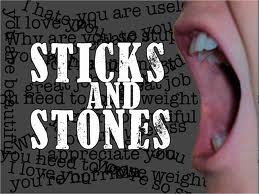
Sticks and Stones May Break My Bones And Also Words Can Hurt Pretty Bad Too
Written by Craig Rogers, Posted on , in Section Teens & Tweens
We all know the expression 'sticks and stones will break my bones but words can never hurt me.' It is the refuge children take when bullies unleash an onslaught of namecalling or verbal abuse. Telling someone else that their words can't hurt us affirms our status as a strong and commanding presence who can't be intimidated. It is evidence of confidence and character. And as it turns out, it may be completely untrue.
A new study from the University of Michigan reveals that when an individual is insulted verbally by another individual or group of individuals, the brain produces natural painkillers, just like it does when an individual endures physical pain.
The evidence shows that when someone gets their feelings hurt, the brain produces opioids. Opioids are just what they sound like, they are opiates created within the brain naturally.
One surprising result of the study was that individuals who exhibited a high level of resiliency produced measurably larger amounts of opioids in response to emotional pain.
On the other hand, subjects in the study who suffered from depression or were dealing with other distressing factors were less likely to produce enough of the painkiller to help them overcome the emotional pain.
This study has vast ramifications in the study and treatment of a variety of mental health conditions that affect troubled young men.
Teenage Males With Behavioral Problems Often Experience Social Rejection
One of the main issues when it comes to teen boys who act out is that they often have poorly developed response mechanisms to handle social rejection. Many troubled boys feel isolated from the peers, and sometimes isolated from their families.
We now know that this rejection is registered not just as psychic trauma, but as actual physical pain. Hopefully this should put to rest any notion that emotional problems are somehow less deserving of treatment or attention than physical ones.
Behavioral patterns are formed during the teenage years, just like many lifelong attitudes are. By recognizing the severity and the potential implications of social rejection that occurs at a young age, treatment professionals may be able to help facilitate alternative pathways, and improve the outcomes for thousands of teen boys dealing with the consequences of social isolation and rejection.
If you have a teen boy who struggles to make friends and is upset or worse over feelings of social rejection, Ashcreek Ranch Academy may be able to help. Call 1-435-215-0500 to learn more.
